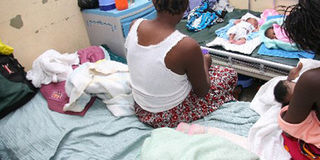Illnesses, hunger, insecurity: Triple threat to Lamu women and children

Mothers in a maternity ward. Maternal deaths in Lamu are still high as many women are yet to embrace modern maternal services. They instead rely in traditional birth attendants. FILE PHOTO | NATION MEDIA GROUP
Many international tourists pay large amounts of money to come to Lamu County and explore its beautiful islands.
But on this picturesque island are sick children and hungry mothers who continue to bear the brunt of poor health services.
In the scorching sun and the baked villages of Boni forest, it does not take a medical degree to tell that most of the children are malnourished.
They are too small for their ages — short, flaky skin, sad. Mothers find it hard to find food, given the current drought.
Residents have called for closed health centres to be reopened, equipped or established, but nothing has happened.
They have been left at the mercy of forces beyond their control.
The areas most affected by the lack of hospital services include the infamous terror-prone Boni forest, and villages on the Kenya-Somalia border such as Kiunga, Madina and Ishakani, as well as Pandanguo, Manda Island, Shee Mgambo.
In Boni forest, for instance, residents of Mangai, Mararani, Milimani and Basuba have been left without health services since 2015, after their dispensaries were closed down because of increased terrorist attacks orchestrated by Al-Shabaab militants.
Pregnant women deliver at home under the supervision of traditional birth attendants.
Some women have ended up dying or losing their newborn babies. Community health volunteers are an integral part of the health system in this county, but they are not enough.
Khadija Athman said she lost her sister earlier this year.
She died after giving birth in their rural village in Basuba in the Boni forest.
She said her sister had suffered from postpartum hemorrhage during delivery, which led to her death.
They invited a traditional birth attendant because the nearest and only dispensary, in Kiangwe village, is over 22km from their home.
But there was no way she could make it on time for delivery. “She tried to give birth at home. Unfortunately, the traditional birth attendant did not handle the birth appropriately and the death could have been avoided if my sister had access to quality maternal health services in a hospital,” Ms Athman said.
Halima Gubo, a resident of Mararani, said many locals cannot afford the more than Sh4,000 needed to hire a motorbike to travel to Kiangwe dispensary for treatment.
The dispensary is too far, she said. “It’s around 55km. Hiring a motorbike will cost you Sh2,100 one way. We’re a poor community and we can’t afford those costs. That’s why we opt to deliver at home no matter the risks to our lives,” Ms Gubo said.
Abdallah Sharif called on the devolved government to establish and equip dispensaries in every village to help residents access health services more easily.
He said a newly built dispensary in Mangai village has not doctors.
“We have a newly constructed health centre at Mangai which has been left idle. Let the county government under our new governor, Issa Timamy, send doctors and nurses here to serve us,” he said.
In Ishakani village, on the Kenya-Somalia border, women and children also have no access to hospital services.
The only available dispensary there has no drugs.
Mothers told Nation.Africa said there is no antenatal and postnatal care.
On Manda Island, residents urged the local government to establish a fully fledged hospital.
Manda has over 8,000 people, with only one poorly equipped dispensary – at the Manda Airport.
“The dispensary has no drugs and personnel. It’s only open for a few hours during daytime,” said Ben Ojuok, a community health volunteer in Manda village.
“There are no services on weekends and public holidays. We need a fully fledged and equipped hospital here. The population here is growing quickly.”
In Pandanguo, residents decry poor roads that hinder access to health services.
In emergencies such as delivery, the village with over 2,000 residents depends on Witu Health Centre, which is about 21km from Pandanguo.
Sharuti Ali, an elder in Pandanguo, said if the Pandanguo-Witu road is upgraded, it will reduce the time locals take to get to the Witu facility.
“Poor transport infrastructure prevents many women in Pandanguo from utilising Witu Health Centre,” Mr Sharuti said.
Governor Timamy has pledged to improve healthcare services and make them more affordable and accessible to all.
“We do not want to hear that a mother has died due to birth complications or a child has died for any treatable ailments anymore,” he said.





